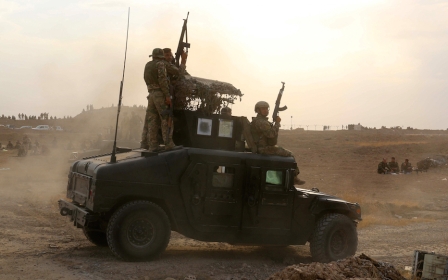Rival Kurdish groups trade deadly gunfire in Iraq's Sinjar

Rival Kurdish groups clashed in Iraq's northwestern Sinjar region on Friday, two Kurdish security sources said, causing deaths on both sides.
The fighting erupted when Peshmerga Rojava forces deployed towards the border with Syria, encroaching on territory controlled by a local affiliate of the Kurdistan Workers' Party. (PKK).
The unrest highlights the risk of conflict and turf wars between the multiple forces arrayed against Islamic State, many of which lean on regional patrons for political support or arms.
"There are martyrs and wounded on both sides," one security source said.
The Peshmerga Rojava force is made up of Kurds from Syria and was formed and trained in Iraq with the backing of Masoud Barzani, the president of Iraq's autonomous Kurdistan region who enjoys good relations with Turkey.
Turkey is at war with the PKK, which established a foothold in Sinjar after aiding Iraq's Yazidi population when Islamic State overran the area in the summer of 2014, and set up a local franchise known as the YBS.
In a statement on Friday, the YBS said the fighting began when the Peshmerga Rojava tried to seize its positions in the town of Khanasor. The YBS accused Turkey of instigating the violence.
"It is a totally provocative initiative," the YBS said.
Turkey's foreign minister, Mevlut Cavusoglu, on Friday said the PKK posed "a threat against the legitimate regional government in Northern Iraq and they are used by some countries against the current administration there."
"It's our duty to destroy these terrorist organizations wherever they are," the minister told reporters in Ankara.
Stay informed with MEE's newsletters
Sign up to get the latest alerts, insights and analysis, starting with Turkey Unpacked
Middle East Eye delivers independent and unrivalled coverage and analysis of the Middle East, North Africa and beyond. To learn more about republishing this content and the associated fees, please fill out this form. More about MEE can be found here.




